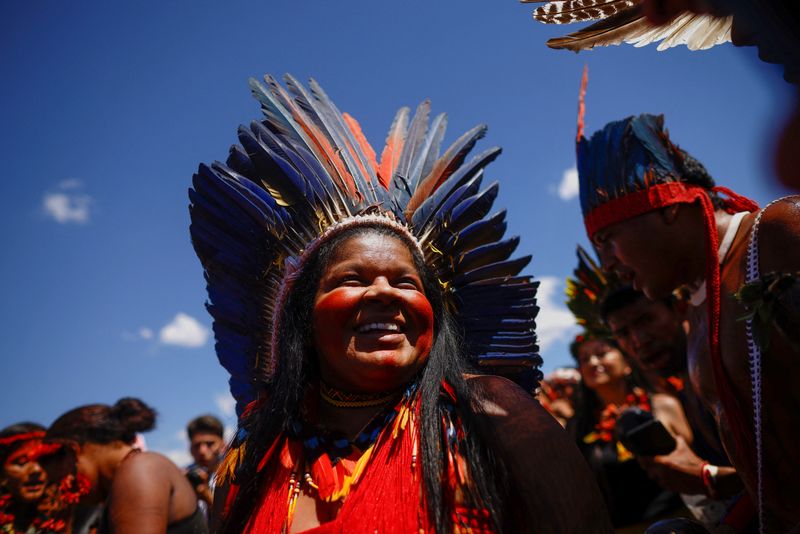
© Reuters. Minister of Indigenous Peoples Sonia Guajajara attends a ritual dance during the third March of Indigenous Women, in defence of women’s rights, local indigenous people and the environment in Brasilia, Brazil September 13, 2023. REUTERS/Adriano Machado
AMZN
-1.05%
Add to/Remove from Watchlist
Add to Watchlist
Add Position
Position added successfully to:
Please name your holdings portfolio
Type:
BUY
SELL
Date:
Amount:
Price
Point Value:
Leverage:
1:1
1:10
1:25
1:50
1:100
1:200
1:400
1:500
1:1000
Commission:
Create New Watchlist
Create
Create a new holdings portfolio
Add
Create
+ Add another position
Close
By Anthony Boadle
BRASILIA (Reuters) – Brazil’s first Indigenous cabinet minister is urging President Luiz Inacio Lula da Silva to veto a bill pushed through Congress by the farm lobby that she and Indigenous leaders warn would undermine ancestral land rights and threaten their way of life.
The bill, which passed in the Senate late last month and now awaits Lula’s signature to become law, would restrict Indigenous reservations to land they lived on in 1988, a deadline that the Supreme Court has ruled unconstitutional.
Lula has until Oct. 20 to veto the legislation, which would pit him against the powerful agribusiness lobby in the world’s top exporter of soy, corn and other farm goods.
Indigenous Affairs Minister Sonia Guajajara told Reuters she is pushing the president not to sign the bill. The largest umbrella organization of Brazil’s Indigenous People (APIB) is campaigning on social media urging Lula to veto the whole bill.
“We still do not know whether he will veto the whole bill or just parts of it, but there will be some form of veto,” Guajajara said in an interview.
Farmers have said the bill will ensure greater legal security of their land ownership, curtailing land conflicts as Brazil’s agricultural frontier advances into the Amazon (NASDAQ:AMZN) region.
Brazil’s Agriculture Minister Carlos Favaro, from the centrist Social Democratic Party in Lula’s minority government coalition, is hoping for a negotiated solution.
“The Supreme Court and the Senate are playing their part. We have to reach a much-needed balance,” he told Reuters.
Lula’s government had planned to veto the whole bill, but is now studying ways to preserve part of the legislation to avoid fueling a growing rift between Congress and the Supreme Court, according to people familiar with deliberations.
“For sure the core of the bill, the 1988 cut-off date, will have to be vetoed because it is unconstitutional,” a source in the president’s office said. “If not, the Supreme Court will overturn it and the conflict will worsen.”
Minister Guajajara said advocates for farmers, cattle ranchers, miners and other influential sectors in Congress had rushed the bill through, allowing no room for debate.
“They want the 1988 deadline so that traditional Indigenous lands that have been invaded or occupied will remain private property of the farmers,” she said.
Lawmakers appended other anti-Indigenous proposals, she said, so the bill allows commercial mining and farming on reservations, including the use of genetically modified crops, and leasing land to non-Indigenous farmers, which is now banned.
If the legislation becomes law, it would limit the creation of new reservations and the expansion of existing ones.
“It also would allow for the expropriation of reservation land if their inhabitants lost their physical and cultural Indigenous traits, which is racist,” Guajajara told Reuters.
Kleber Karipuna, APIB’s executive coordinator, said the “totally unconstitutional” bill was a threat to the existence of Brazil’s 1.6 million Indigenous people and his organization will ask the Supreme Court to revoke it if it becomes law.
“We have asked for a meeting with Lula and are waiting for a reply,” he said in an interview.
Source: Investing.com





























